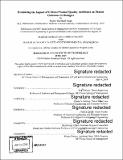| dc.contributor.advisor | Roy Welsch and Duane S. Boning. | en_US |
| dc.contributor.author | Singh, Shalini Shreekant. | en_US |
| dc.contributor.other | Sloan School of Management. | en_US |
| dc.contributor.other | Massachusetts Institute of Technology. Department of Civil and Environmental Engineering. | en_US |
| dc.contributor.other | Leaders for Global Operations Program. | en_US |
| dc.date.accessioned | 2019-10-11T22:24:39Z | |
| dc.date.available | 2019-10-11T22:24:39Z | |
| dc.date.copyright | 2019 | en_US |
| dc.date.issued | 2019 | en_US |
| dc.date.issued | 2019 | en_US |
| dc.identifier.uri | https://hdl.handle.net/1721.1/122583 | |
| dc.description | Thesis: M.B.A., Massachusetts Institute of Technology, Sloan School of Management, 2019, In conjunction with the Leaders for Global Operations Program at MIT | en_US |
| dc.description | Thesis: S.M., Massachusetts Institute of Technology, Department of Civil and Environmental Engineering, 2019, In conjunction with the Leaders for Global Operations Program at MIT | en_US |
| dc.description | Cataloged from PDF version of thesis. | en_US |
| dc.description | Includes bibliographical references (page 51). | en_US |
| dc.description.abstract | The primary goal of this project is to link critical product quality attributes in biological medicines with patient outcomes as evidenced by clinical trial data. This project adopts a novel methodology of applying statistical and machine learning models on a dataset combining data on clinical outcomes, patient population characteristics, and product attributes. Understanding the mechanisms driving patient outcomes will help us develop risk-based control strategies for product attributes. Ultimately, our project can lead to better patient usability, greater flexibility in the manufacturing process, and improved competitive positioning in the market. We focus on de-risking one product attribute, high molecular weight species (HMW) and one patient outcome, development of anti-drug antibody (ADA) response in patients given consistent regulatory authority focus on the role of HMW in determining patient safety associated with the use of biological medicines. Although there is some correlation between ADA response and HMW exposure in patients, our findings strongly suggest the the importance of factors beyond HMW exposure, such as patient conditions and exposure to other attributes, in driving patient outcomes. As such, we have provided evidence to suggest that HMW exposure does not by itself increase the likelihood of a patient developing an ADA response. | en_US |
| dc.description.statementofresponsibility | by Shalini Shreekant Singh. | en_US |
| dc.format.extent | 51 pages | en_US |
| dc.language.iso | eng | en_US |
| dc.publisher | Massachusetts Institute of Technology | en_US |
| dc.rights | MIT theses are protected by copyright. They may be viewed, downloaded, or printed from this source but further reproduction or distribution in any format is prohibited without written permission. | en_US |
| dc.rights.uri | http://dspace.mit.edu/handle/1721.1/7582 | en_US |
| dc.subject | Sloan School of Management. | en_US |
| dc.subject | Civil and Environmental Engineering. | en_US |
| dc.subject | Leaders for Global Operations Program. | en_US |
| dc.title | Evaluating the impact of critical product quality attributes on patient outcomes in biologics | en_US |
| dc.type | Thesis | en_US |
| dc.description.degree | M.B.A. | en_US |
| dc.description.degree | S.M. | en_US |
| dc.contributor.department | Sloan School of Management | en_US |
| dc.contributor.department | Massachusetts Institute of Technology. Department of Civil and Environmental Engineering | en_US |
| dc.contributor.department | Leaders for Global Operations Program | en_US |
| dc.identifier.oclc | 1119391580 | en_US |
| dc.description.collection | M.B.A. Massachusetts Institute of Technology, Sloan School of Management | en_US |
| dc.description.collection | S.M. Massachusetts Institute of Technology, Department of Civil and Environmental Engineering | en_US |
| dspace.imported | 2019-10-11T22:24:38Z | en_US |
| mit.thesis.degree | Master | en_US |
| mit.thesis.department | Sloan | en_US |
| mit.thesis.department | CivEng | en_US |
